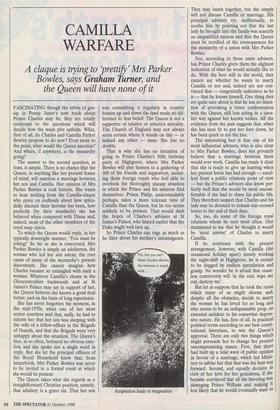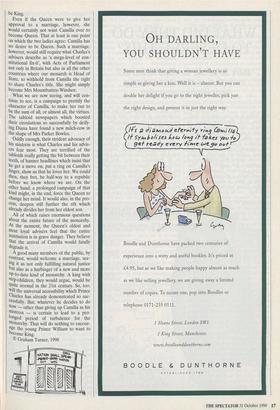CAMILLA WARFARE
A claque is trying to 'prettify' Mrs Parker
Bowles, says Graham Turner, and
the Queen will have none of it
FASCINATING though the titbits of gos- sip in Penny Junor's new book about Prince Charles may be, they are totally irrelevant to the questions which will decide how the main plot unfolds. What, first of all, do Charles and Camilla Parker Bowles propose to do now? Even more to the point, what would the Queen sanction? And where, if anywhere, is the monarchy going?
The answer to the second question, at least, is simple. There is no chance that the Queen, in anything like her present frame of mind, will sanction a marriage between her son and Camilla. Her opinion of Mrs Parker Bowles is rock bottom. She wants to hear nothing from the Camilla-claque who prate on endlessly about how splen- didly discreet their heroine has been, how perfectly (by their standards) she has behaved when compared with Diana and, indeed, most of the other members of the royal soap opera.
To which the Queen would reply, in her typically downright manner, 'You must be joking!' So far as she is concerned, Mrs Parker Bowles is simply an adulteress, the woman who led her son astray, the root cause of many of the monarchy's present discontents. She cannot imagine how Charles became so entangled with such a woman. Whatever Camilla's chums in the Gloucestershire backwoods and at St James's Palace may say in support of her, the Queen believes she knows a good deal better, and on the basis of long experience.
She has never forgotten the moment, in the mid-1970s, when one of her most senior courtiers said that, sadly, he had to inform her that her son was sleeping with the wife of a fellow-officer in the Brigade of Guards, and that the Brigade were very unhappy about the situation. The Queen's face, as so often, betrayed no obvious emo- tion and she spoke not a single word in reply. But she let the principal officers of the Royal Household know that, from henceforth, Mrs Parker Bowles was never to be invited to a formal event at which she would be present.
The Queen takes what she regards as a straightforward Christian position; namely, that adultery is a grave sin. That her son was committing it regularly in country houses up and down the land made no dif- ference to that belief. The Queen is not a supporter of relative or selective morality. The Church of England may not always seem certain where it stands on this — or indeed any other — issue. She has no doubts.
That is why she has no intention of going to Prince Charles's 50th birthday party at Highgrove, where Mrs Parker Bowles will play hostess to a gathering of 300 of his friends and supporters, includ- ing those foreign royals who feel able to overlook the thoroughly uneasy situation in which the Prince and his mistress find themselves. Prince Philip, understandably perhaps, takes a more tolerant view of Camilla than the Queen, but he too seems unlikely to be present. That would dash the hopes of Charles's advisers at St James's Palace, who hinted earlier that the Duke might well turn up.
So Prince Charles can rage as much as he likes about his mother's intransigence.
Assignation leads to resignation They may lunch together, but she simply will not discuss Camilla or marriage. His principal advisers try, ineffectually, to soothe him by pointing out that the last lady he brought into the family was scarcely an unqualified success and that the Queen must be terrified of the consequences for the monarchy of a union with Mrs Parker Bowles.
Nor, according to those same advisers, has Prince Charles given them the slightest indication of what he would actually like to do. With the best will in the world, they cannot say whether he wants to marry Camilla or not and, indeed are not con- vinced that — congenitally indecisive as he is — that he knows himself. One thing they are quite sure about is that he has no inten- tion of provoking a bitter confrontation with the Queen, still less acting in a cava- lier way against her known wishes. All the evidence from the past suggests that, when she has seen fit to put her foot down, he has been quick to toe the line.
The astonishing fact is that one of his most influential advisers, who is also close to Mrs Parker Bowles, does not privately believe that a marriage between them would ever work. Camilla has made it clear that she is ready to give up hunting when her present horse has had enough — excel- lent from a public relations point of view — but the Prince's advisers also know per- fectly well that she would be most uncom- fortable if she had to share his public life. They therefore suspect that Charles and his lady may be doomed to remain star-crossed lovers to the end of their days.
So, too, do some of the foreign royal relations whom he sees most often. One murmured to me that he thought it would be 'most unwise' of Charles to marry Camilla.
If he continues with the present arrangement, however, with Camilla (the occasional holiday apart) mostly working the night-shift at Highgrove, he is certain to be dogged by endless speculation and gossip. No wonder he is afraid that cease- less controversy will 'in the end, wipe me out, destroy me'.
But let us suppose that he took the route which many of us might choose and, despite all the obstacles, decide to marry the woman he has loved for so long and who seems to be an indispensable prop, an essential antidote to his somewhat depres- sive nature. He has, first of all, in practical political terms according to our best consti- tutional historians, to win the Queen's approval. There are only two things which might persuade her to change her present uncompromising stance. First, that there had built up a tidal wave of public opinion in favour of a marriage, which led Minis- ters to advise her that that was the best way forward. Second, and equally decisive in view of her love for her grandsons, if she became convinced that all the havering was damaging Prince William and making it less likely that he would eventually want to be King.
Even if the Queen were to give her approval to a marriage, however, she would certainly not want Camilla ever to become Queen. That at least is one point on which the two ladies agree: Camilla has no desire to be Queen. Such a marriage, however, would still require what Charles's advisers describe as 'a mega-level of con- stitutional fix-it', with Acts of Parliament not only in Britain but also in all the other countries where our monarch is Head of State, to withhold from Camilla the right to share Charles's title. She might simply become Mrs Mountbatten-Windsor.
What we are now seeing, and will con- tinue to see, is a campaign to prettify the character of Camilla, to make her out to be the sum of all, or almost all, the virtues. The tabloid newspapers which boosted their circulations so successfully by deify- ing Diana have found a new milch-cow in the shape of Mrs Parker Bowles.
Oddly enough, their strident advocacy of his mistress is what Charles and his advis- ers fear most. They are terrified of the tabloids really getting the bit between their teeth, of banner headlines which insist that he get a move on, put a ring on Camilla's finger, show us that he loves her. We could then, they fret, be half-way to a republic before we know where we are. On the other hand, a prolonged campaign of that kind might, in the end, force the Queen to change her mind. It would also, in the pro- cess, deepen still further the rift which already divides her from her eldest son.
All of which raises enormous questions about the entire future of the monarchy. At the moment, the Queen's oldest and Most loyal advisers feel that the entire institution is in grave danger. They believe that the arrival of Camilla would fatally degrade it.
A good many members of the public, by Contrast, would welcome a marriage, see- ing it as not only fulfilling natural justice but also as a harbinger of a new and more up-to-date kind of monarchy. A king with step-children, they would argue, would be quite normal in the 21st century. So, too, will the universal accessibility which Prince Charles has already demonstrated so suc- cessfully. But, whatever he decides to do now — other than giving up Camilla as his mistress — is certain to lead to a pro- longed period of turbulence for the monarchy. That will do nothing to encour- age the young Prince William to want to become King. 0 Graham Turner, 1998



















































































 Previous page
Previous page